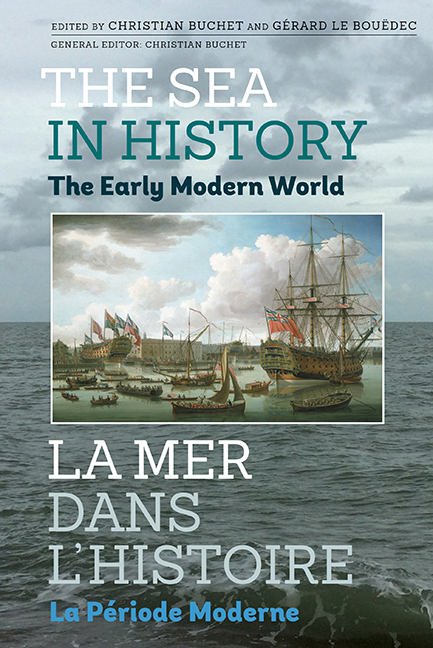Book contents
- Frontmatter
- Contents
- List of Illustrations
- List of Contributors
- Introduction générale et remerciements par
- General introduction and acknowledgements
- Introduction (français)
- Introduction (English)
- LA RÉUSSITE PAR LA MER:La reussite par la mer des territoires et des communautés littorales
- La construction d'un espace mondial: La circulation maritime et les ports
- La forte croissance de l'économie des pêches et des échanges
- Les acteurs de la dynamique maritime
- LA PUISSANCE MARITIME INSTRUMENT DE LA PUISSANCE POLITIQUE ET D'UNE STRATÉGIE GLOBALE DE RAYONNEMENT VOIRE DE DOMINATION: Les puissances maritimes occidentales
- L'océan Indien, entre convoitises et indifférences
- Les puissances maritimes asiatiques
- L'Afrique
- La politique maritime et l'idéologie
- Mer et développement technologique
- Développement maritime et maîtrise économique et financière
- Le rôle capital de la mer pour les transformations agricoles
- The sea and the precocious transition of the British isles into a hegemonic political and economic power, 1651–1815
- Les compagnies de commerce, instruments de la puissance maritime Philippe Haudrère
- Marines européennes, développements administratif, économique et financier
- Développement naval et développement commercial: les leçons de l'Histoire
- De la primauté des capitales maritimes sur les capitales terrestres Pierre-François Tuel
- The rise and fall of the Chinese pirates: from initiators to obstructors of maritime trade
- Développement maritime et maîtrise organisationnelle
- Conclusion (français)
- Conclusion (English)
- Conclusion générale par
- General conclusion by
- Miscellaneous Endmatter
- Miscellaneous Endmatter
The sea and the precocious transition of the British isles into a hegemonic political and economic power, 1651–1815
from Développement maritime et maîtrise économique et financière
Published online by Cambridge University Press: 11 May 2017
- Frontmatter
- Contents
- List of Illustrations
- List of Contributors
- Introduction générale et remerciements par
- General introduction and acknowledgements
- Introduction (français)
- Introduction (English)
- LA RÉUSSITE PAR LA MER:La reussite par la mer des territoires et des communautés littorales
- La construction d'un espace mondial: La circulation maritime et les ports
- La forte croissance de l'économie des pêches et des échanges
- Les acteurs de la dynamique maritime
- LA PUISSANCE MARITIME INSTRUMENT DE LA PUISSANCE POLITIQUE ET D'UNE STRATÉGIE GLOBALE DE RAYONNEMENT VOIRE DE DOMINATION: Les puissances maritimes occidentales
- L'océan Indien, entre convoitises et indifférences
- Les puissances maritimes asiatiques
- L'Afrique
- La politique maritime et l'idéologie
- Mer et développement technologique
- Développement maritime et maîtrise économique et financière
- Le rôle capital de la mer pour les transformations agricoles
- The sea and the precocious transition of the British isles into a hegemonic political and economic power, 1651–1815
- Les compagnies de commerce, instruments de la puissance maritime Philippe Haudrère
- Marines européennes, développements administratif, économique et financier
- Développement naval et développement commercial: les leçons de l'Histoire
- De la primauté des capitales maritimes sur les capitales terrestres Pierre-François Tuel
- The rise and fall of the Chinese pirates: from initiators to obstructors of maritime trade
- Développement maritime et maîtrise organisationnelle
- Conclusion (français)
- Conclusion (English)
- Conclusion générale par
- General conclusion by
- Miscellaneous Endmatter
- Miscellaneous Endmatter
Summary
ABSTRACT. The development of the British naval power from 1642 onwards was a decisive element in a precocious industrialization and a powerful commercial development that generated in turn, by a retroactive phenomenon, the capacity to develop a naval instrument. The initial impetus was the political will of the central power shared by the elites to ensure a royal and then Jacobin restoration. The financial mobilization for this naval development resulted in the implementation of particularly sophisticated financial institutions and tools allowing the constant development of the naval instrument, which was both the cause and the consequence of an economy boosted by increasing urbanization and industrial and commercial development.
RÉSUMÉ. Le développement de la puissance navale britannique à partir des années 1642 fut l'élément décisif d'une industrialisation précoce et d'un puissant développement commercial générant à leur tour, par un phénomène de rétroaction, la capacité de développer encore l'instrument naval. L'aiguillon originel fut la volonté politique du pouvoir central, partagée par les élites, de se prémunir d'une restauration royale, puis jacobite. La mobilisation financière pour ce développement naval aboutit à la mise en place d'institutions financières et d'outils financiers particulièrement sophistiqués ayant permis le développement constant de l'instrument naval, tout à la fois cause et conséquence d'une économie portée par l'urbanisation croissante, le développement industriel et commercial.
For whosoever commands the Sea commands the Trade: whoever commands the Trade commands the Riches of the World and consequently the World itself.'
Sir Walter RaleighGeopolitical reductionism is no longer a favoured mode for constructing historical narratives to explore and explain the precocious transition of the British Isles into a global hegemonic political and economic power. By the 17th century the advantages of an off-shore location had become transparent to its aristocracy and merchants and to rival ruling elites on the mainland of Europe. Those natural advantages flowed from sea lanes surrounding the Isles connected to rivers and tributaries reaching inland into a country where almost no hamlet, village or town was more than 70 miles from open sea or a days journey from a tidal river linked to the seas and oceans of the world.
- Type
- Chapter
- Information
- The Sea in History - The Early Modern World , pp. 756 - 762Publisher: Boydell & BrewerPrint publication year: 2017

